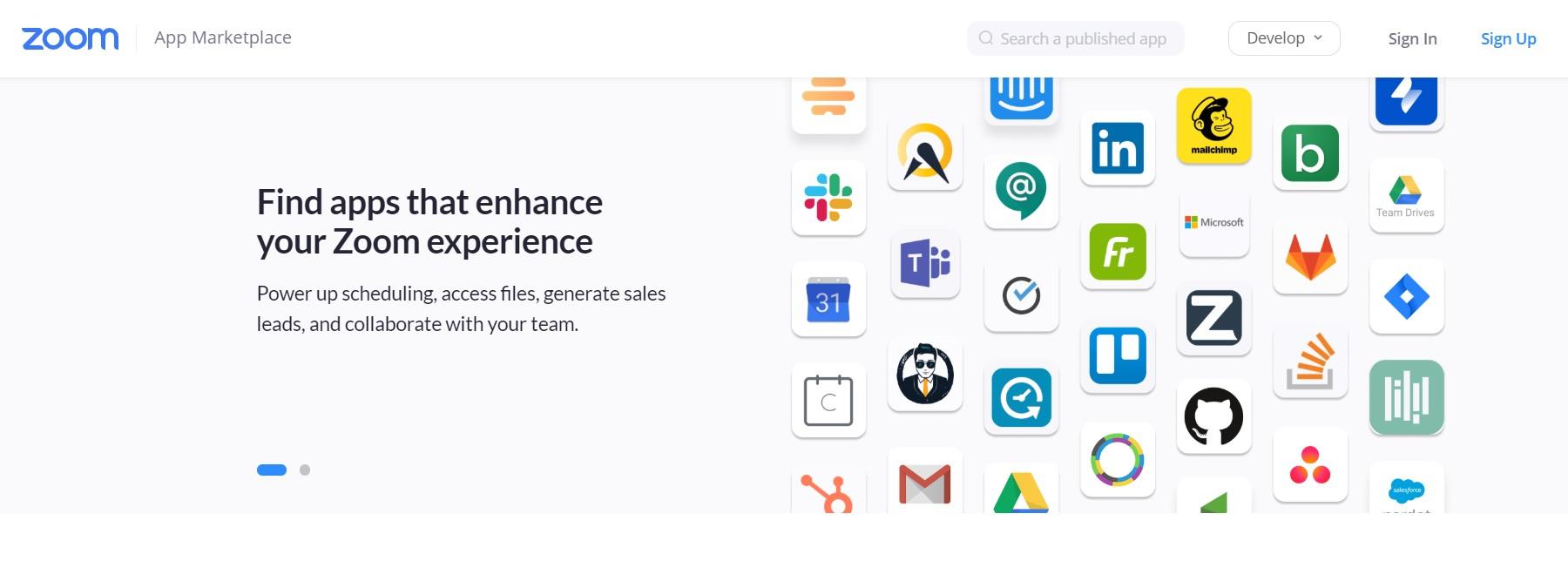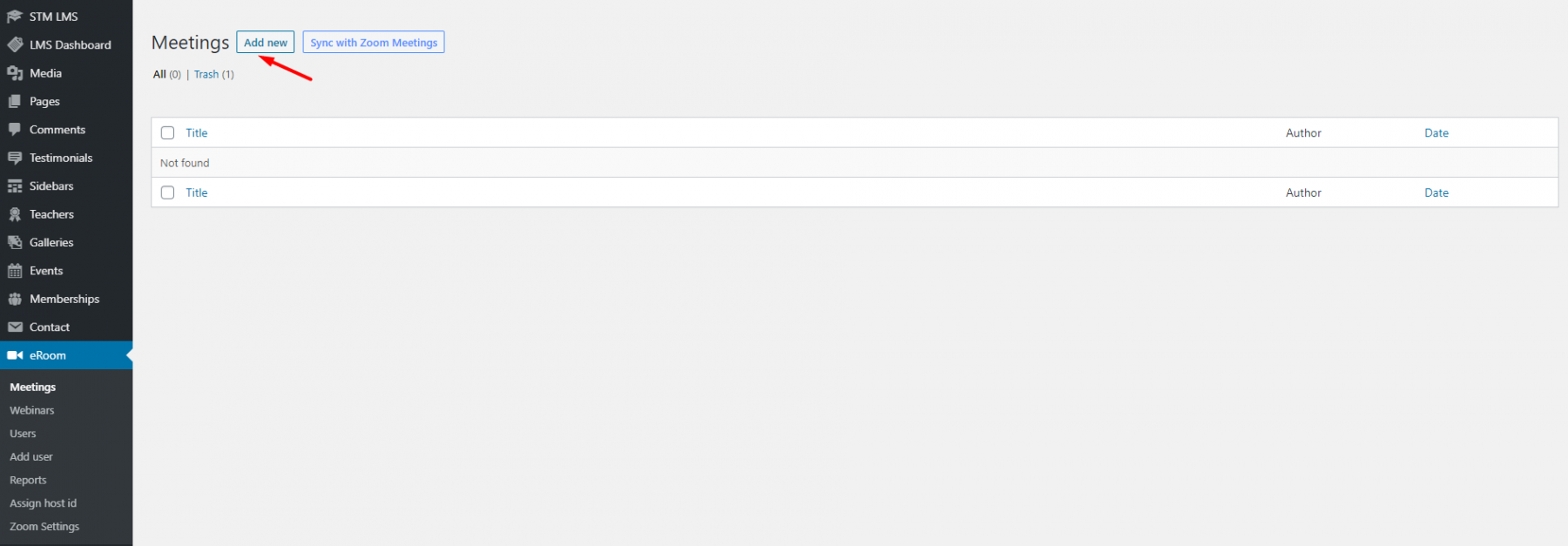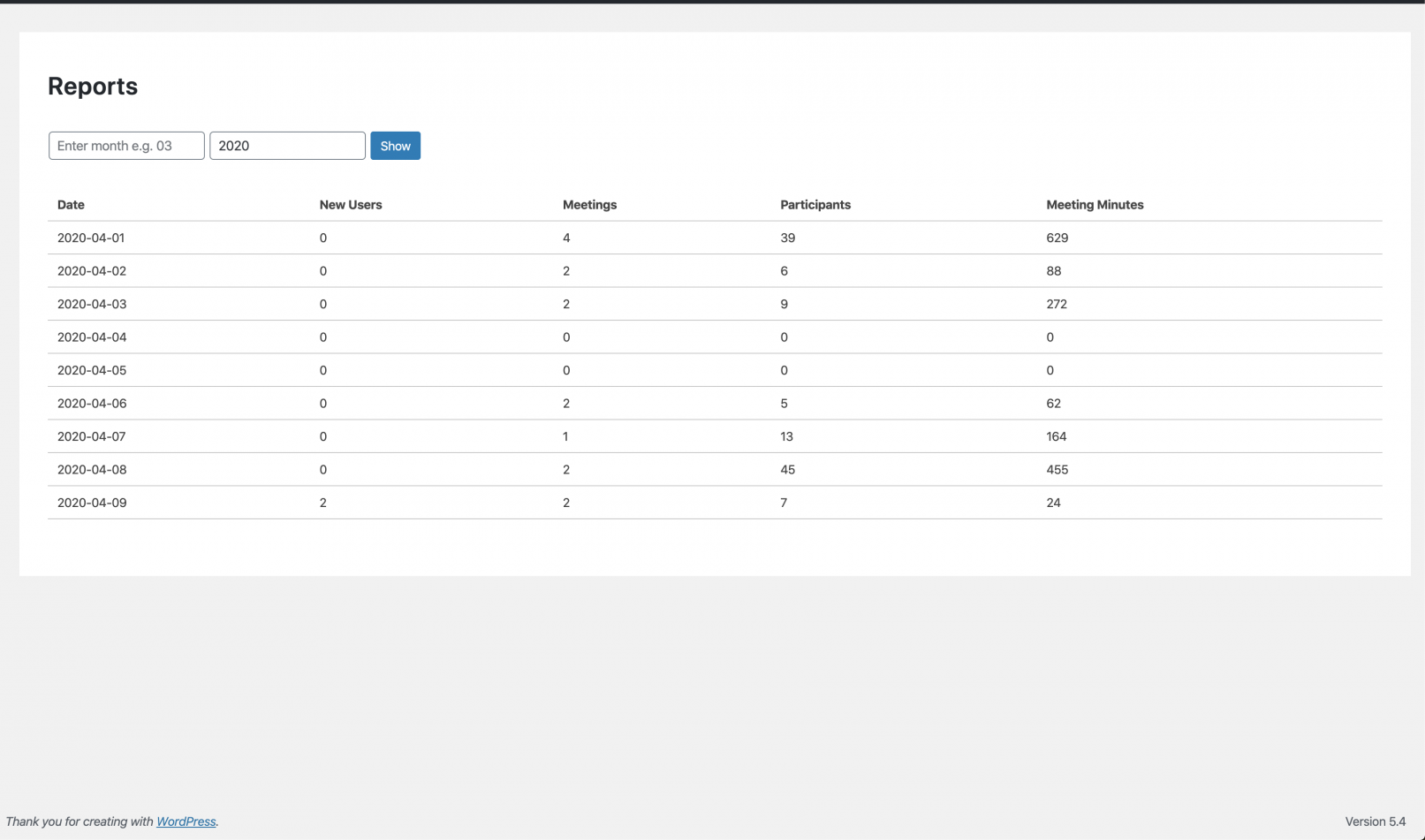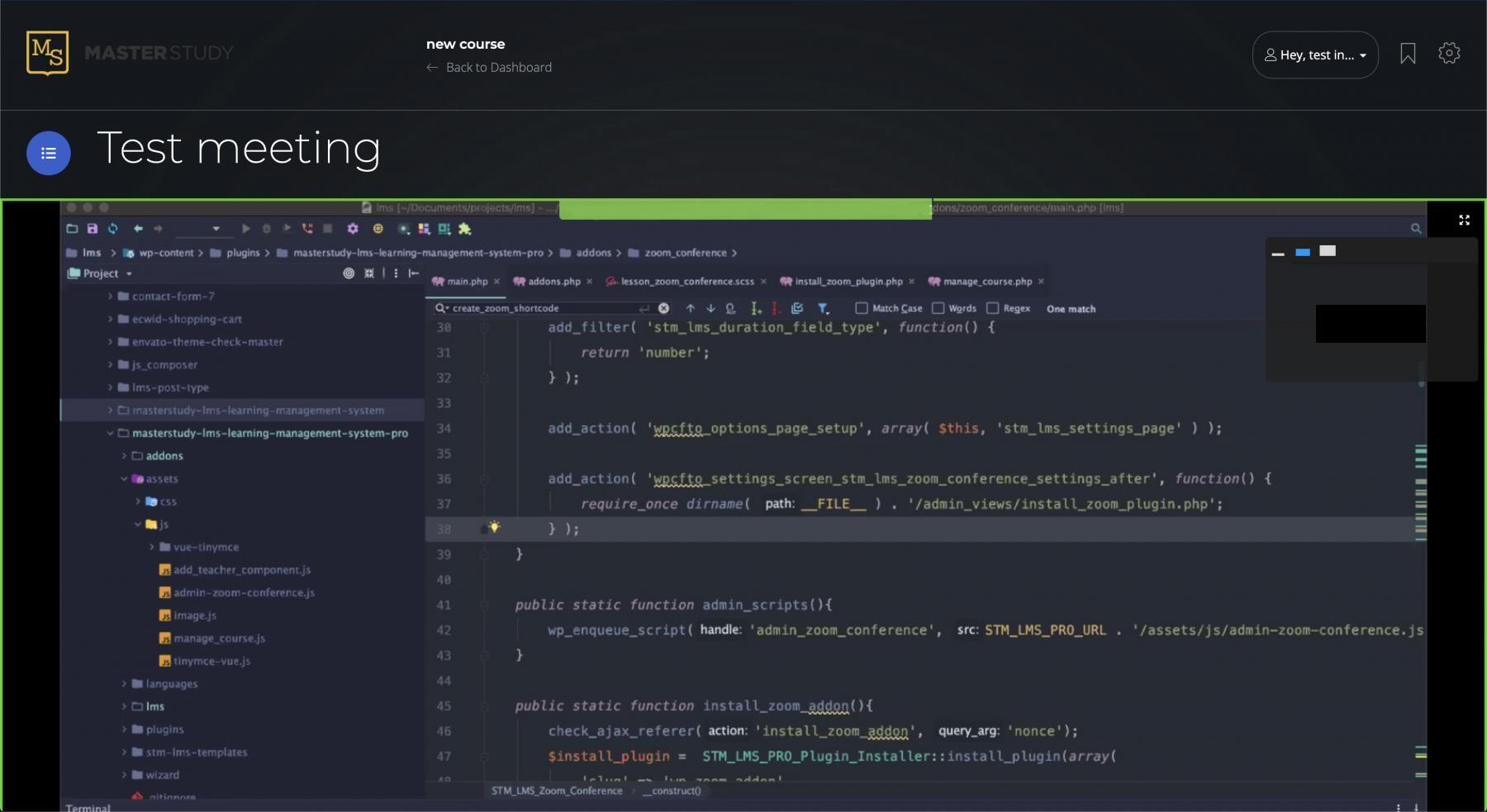Zoom Video Conferencing
To use Zoom and implement the service in your work you need to enable Zoom Conference Addon. For this, from your dashboard panel go to STM LMS > Addons.

Find there Zoom Conference Addon and enable it. Click on the Settings icon in the top right corner to open the new page, where you will be offered to Install eRoom - Zoom Meetings & Webinar plugin.
Click on the Install Plugin button.

Once the plugin is installed you can open the Zoom settings. On your dashboard panel, you now can find the eRoom menu. Click on the Zoom Settings option to set it up (eRoom > Zoom Settings).

You will be required to enter some credentials: API Key and API Secret Key. You can collect these credentials on Zoom App Marketplace. Follow this link: https://marketplace.zoom.us/ to obtain your API Key/Secret.
How to Obtain APIs
You will be required to enter some credentials: JWT API and Meeting SDK APIs. You can collect these credentials on Zoom App Marketplace. To collect credentials, follow Zoom App Marketplace: https://marketplace.zoom.us/ and login into your existing Zoom account. If a Zoom account does not exist, it should be created using this link.
On the Zoom App Marketplace page click on the Develop button and from the dropdown menu select the option Build App.


On the opened page, the App type should be selected to generate credentials.

eRoom requires Server-to-Server OAuth and Meeting SDK APIs to connect with Zoom and use its functionalities.
To make the Zoom Credentials work, the SSL should be activated on your domain.
SERVER-TO-SERVER OAUTH CREDENTIALS
Generating API Credentials:
Among available Apps select Server-to-Server OAuth type and click Create to generate APIs.

Then, in the Popup window add your app name:

As soon as App created API credentials will be generated automatically in the App Credentials section:

Then, it is required to add information for the app such as email, and description in the Information section. In the Information section, it is required to fill out the following fields:
Company Name
Developer Contact Name
Developer Contact Email

It is required to select the correct scopes to make the plugin work. Open the scopes tab and click on the "Add Scopes" button:

The permissions listed below are required:
Permission issue error notices may appear while creating the meetings or webinars when any of the listed Scopes are not enabled.
Meeting
View and manage sub account’s user meetings (meeting:master).
View all user meetings (meeting:read:admin).
View and manage all user meetings (meeting:write:admin).

Webinar
View and manage sub account’s user webinars (webinar:master).
View all user Webinars (webinar:read:admin).
View and manage all user Webinars (webinar:write:admin).

Recording
View and manage sub account’s user recordings (recording:master).
View all user recordings (recording:read:admin).
View and manage all user recordings (recording:write:admin).

User
View and manage sub account’s user information (user:master).
View all user information (user:read:admin).
View users information and manage users (user:write:admin).

After adding all listed Scopes, click on the Done button to close the window. Finally, activate the Server-to-Server App:

Copy the Account ID, Client ID, and Client Secret and paste them into the respective fields on the Zoom Settings page in your dashboard:

JWT (JSON WEB TOKEN) Credentials (deprecated)
Zoom is deprecating their JWT app from June of 2023 and until the deadline, all your current APIs will work. Please see JWT App Type Depreciation FAQ for more details. It is recommended to run the migration wizard to smooth the transition to the new Server to Server OAuth system.
Among available Apps select JWT type and click Create to generate APIs.

Then, in the Popup window set a name for App:

Then, it is required to add information for the app such as email, and description in the Information section. In the Information section it is required to fill out following fields:
Company Name
Developer Contact Name
Developer Contact Email

As soon as App created API credentials will be generated automatically in App Credentials section:

Copy the API Key and API Secret Key and paste them in the respective fields on the Zoom Settings page in your dashboard.

Under the API Key field, you can also find the link to the guide on how to obtain the credentials.
Meeting SDK Credentials
Zoom Meeting SDK offers video-conferencing features that mirror the meeting experience in the Zoom Client. Meeting SDK is required to make Join In Browser work.
Among available Apps select Meeting SDK API type and click Create to generate APIs.

Then, in the Popup window set a name for App:

The toggle button should be disabled in the "Would you like to publish this app on Zoom Marketplace" section.
In the Information section, it is required to fill out the following fields:
App Name
Short description
Long description
Company Name
Developer Name
Developer Email address

As soon as the Required information is filled out, go to the Download section:

As soon Continue button is clicked, API credentials will be generated automatically in the App Credentials section:

Copy the API Key and API Secret Key and paste them into the respective fields on the Zoom Settings page in your dashboard.

Redirect URL for OAuth
Destination URL where Zoom will send the access token after the user completes the OAuth authentication. To get the "Redirect URL for OAuth" open Zoom Settings on your dashboard and copy the URL from the address bar:

Paste the URL to the Redirect URL for OAuth input:

Next, it is required to add the domain (example: https://your-domain.com) to the "OAuth allow list" to make the Metting SDK secure:

Next, go to the SDK Activation tab, and click on the "Add" button to complete the API generation progress.

On the opened window, click on the "Allow" button to give access permission:

Under the API Key field, you can also find the link to the guide on how to obtain the credentials.
How to use Zoom Meetings?
To make sure the instructors can select a lesson type Zoom Conference in the Frontend Course Builder, go to Users > Select user > Edit User. Scroll down to the Zoom Settings, find there Meeting Host section and Select Host from the dropdown menu.

Zoom addon allows you to easily add new users. Those users can be added as Hosts, which means that they will be able to host and create their own meetings.
Please note for each Instructor on the website the admin should specify the Host. Multiple instructors can be applied to the same Host if you have a free Zoom account with only one Host available. In that case, those instructors can add and conduct video sessions themselves. But they can't stream conferences at the same time.
If there are many instructors and there is a possibility of having conferences at the same time, you need to purchase a premium Zoom plan with a bigger number of hosts: https://zoom.us/pricing
To add a new user, go to eRoom > Add User, and on the new page fill in the necessary information and save.

On the Users page, you can see all the users in your account.

How to Add Meetings
From the Meetings (eRoom > Meetings) menu, you can open the meeting page and create a new meeting or edit the existing one.

The plugin allows you to submit all the information about the meeting, such as title, meeting date and time, host and agenda, specifications about the timezone and meeting duration.

Instructors can add meetings via the frontend page builder. Go to Course Curriculum, find the needed lesson, go to Lesson Settings > Lesson Type and select Zoom Conference type from the options available in the dropdown menu.
You can specify the start date and time, and timezone and enable the following functions: Join before Host, Host join started.

There is also a shortcode that you can add to any page on your website.

Just copy the shortcode and paste it into the page.

In that case, on this particular page will appear a countdown for the planning meeting.

Please pay attention that the correctness of a countdown depends on the Time Zone you set. For a meeting, you can set a time zone when creating one.
If the meeting has already started, instead of a countdown there will be meeting details provided on the page along with the Join Meeting buttons where users have two options, either to join the meeting in the browser or access the session via the Zoom app.


Zoom addon also lets you collect the Reports.
Go to eRoom > Reports menu and access the Reports page. Specify month and year for the data you want to see and you will get your meetings statistics such as the number of meetings, participants and new users.

Let’s have a look at the live meetings page. The image below showcases the meeting page of the Zoom App for macOS.
Please note there are different Zoom Clients/Extensions/Apps for different systems and platforms. You can download the needed client version browser extension here: https://zoom.us/download
This is how it should look from the student's perspective.
During the session, you can enable screen viewing mode. When the meeting is over you will see the overall time spent on the video session and will be able to complete it.

Last updated
Was this helpful?

